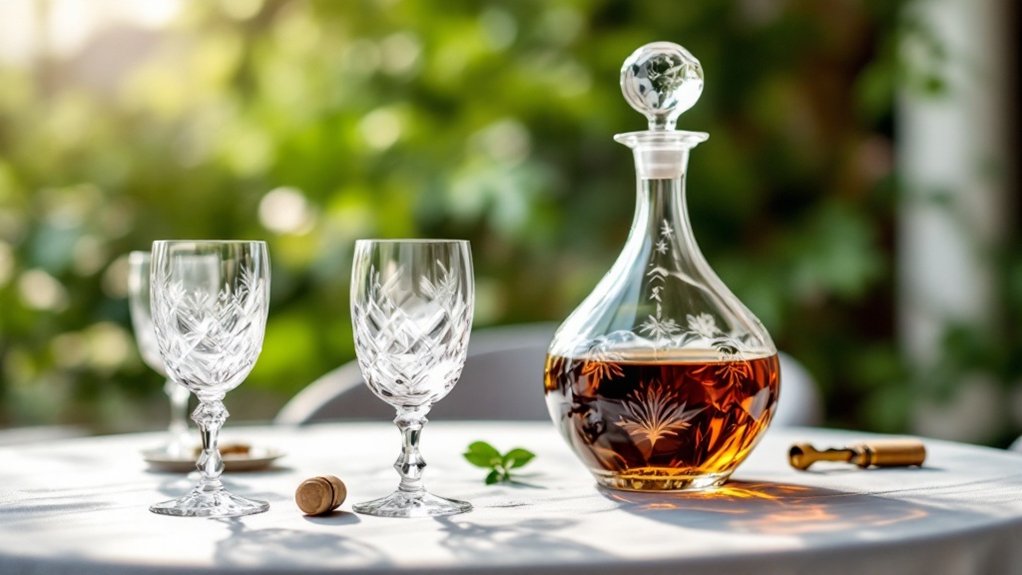In the world of beverages, the choice of glassware plays an essential role in the overall experience. Different types of glasses are meticulously designed to enhance flavors and aromas. Understanding the nuances of glass shape can greatly influence how one perceives a drink. This exploration opens up new avenues for entertaining. As one considers the ideal vessel for each beverage, questions arise about maintenance and creative uses. What might be the best approach to elevate every pour?
Understanding Different Types of Glassware
Glassware encompasses a wide variety of vessels designed for specific functions and aesthetic appeal. Each type serves a unique purpose, enhancing the experience of beverages. For instance, wine glasses come in various shapes to complement different varietals, while highball glasses are ideal for mixed drinks, or for serving the best thc seltzer over ice in legal, adult-only settings. Tumblers, often used for whiskey, offer a robust design suited for sipping. Specialty glassware, such as shot glasses and cocktail coupes, caters to distinct serving styles, elevating the presentation. Additionally, decorative elements like etching or colored glass can add visual interest. Understanding these types allows enthusiasts to select the appropriate glassware, ensuring that each pour is not only functional but also visually appealing, creating a more enjoyable drinking experience overall. Investing in renewable energy technologies can also enhance the overall experience by promoting a healthier environment.
The Impact of Glass Shape on Flavor
While the choice of glassware often seems purely aesthetic, the shape of a glass greatly influences the perception of flavor. Different shapes affect how aromas are concentrated and how liquids interact with the palate. For instance, a wide bowl allows for greater surface area, enhancing the release of volatile compounds, which can intensify the aroma and overall tasting experience. Conversely, a narrower glass may direct aromas more efficiently towards the nose, allowing for a focused sensory experience. Additionally, the curvature of the rim can alter the way a beverage flows onto the tongue, impacting taste perception. Consequently, understanding the relationship between glass shape and flavor perception can elevate the enjoyment of any drink, making every pour truly special. Moreover, the principles of energy efficiency can be applied to the design of glassware, ensuring that production processes are sustainable and environmentally friendly.
Choosing the Right Glass for Your Beverage
How does one determine the ideal glass for a specific beverage? Selecting the right glass involves understanding the characteristics of the drink itself. For example, wide bowls are often preferred for red wines to enhance aeration, while narrower glasses suit white wines, preserving their crispness. Beer enthusiasts typically choose pint glasses or tulip-shaped glasses to capture aromas, while cocktails can shine in coupe or highball glasses, depending on their ingredients. Spirits and liqueurs benefit from shorter tumblers or snifters, which allow for savoring the aroma. Ultimately, the chosen glass should enhance the overall drinking experience, emphasizing the beverage’s unique qualities, temperature, and visual appeal, ensuring each pour feels special and enjoyable. Additionally, effective policies play a crucial role in shaping the environment in which beverages are enjoyed, contributing to a sustainable future.
Caring for and Maintaining Your Glassware
Maintaining glassware requires attention to detail to guarantee longevity and peak performance. Proper cleaning is essential; handwashing is often recommended to prevent scratches and preserve clarity. Using a gentle dish soap and soft cloth guarantees that delicate glass remains undamaged. Avoid using abrasive cleaners or scouring pads. For stubborn stains, a mixture of baking soda and water can be effective.
Drying glassware with a lint-free cloth prevents water spots and streaks. Storage is also important; glasses should be stored upright to avoid chipping and stacking should be minimized. Regularly inspecting for chips or cracks allows for early detection of damage, guaranteeing safety during use. By following these guidelines, one can keep their glassware looking pristine and functioning effectively for years to come. Additionally, fostering a culture of sustainability inspires collective action toward maintaining household items can contribute to overall decarbonization efforts.
Creative Ways to Use Glassware for Entertaining
Properly maintained glassware not only enhances aesthetic appeal but also opens up a domain of creative possibilities for entertaining. Hostesses can elevate their gatherings by using unique glassware as serving vessels. For example, a tall glass can showcase a colorful fruit salad, while a vintage coupe can hold individual desserts. Additionally, glasses filled with fairy lights can create an enchanting ambiance. Customizable drink stations featuring various glass types allow guests to craft personalized cocktails, encouraging interaction. Using glassware for floral arrangements also adds elegance; small vases can serve as table centerpieces. With a little imagination, glassware transforms from mere containers into integral elements of the entertaining experience, mesmerizing guests and leaving lasting impressions. Moreover, incorporating renewable technologies in the entertaining process can also reduce the environmental impact of gatherings.
Frequently Asked Questions
Can I Use Plastic Glassware Instead of Glass for Outdoor Events?
Yes, plastic glassware can be used for outdoor events. It offers durability and convenience, minimizing the risk of breakage. However, the aesthetic and taste experience of drinks may differ compared to traditional glass options.
What Is the Best Way to Remove Stains From Glassware?
The best way to remove stains from glassware involves soaking them in a solution of vinegar and baking soda, followed by gentle scrubbing with a non-abrasive sponge. Rinse thoroughly for a sparkling finish.
How Do I Prevent My Glassware From Breaking Easily?
To prevent glassware from breaking easily, one should handle it with care, store it properly away from heavy items, avoid extreme temperature changes, and use cushioning materials, such as cloth or foam, during transport.
Is There a Difference Between Leaded and Non-Leaded Glassware?
Leaded glassware contains lead oxide, enhancing clarity and brilliance, while non-leaded glass is made with alternative materials, offering durability and safety. The choice depends on aesthetic preference and intended use, balancing beauty and practicality.
Can I Put My Glassware in the Dishwasher Safely?
Most glassware is dishwasher-safe, but it’s advisable to check manufacturer guidelines. Delicate pieces may warp or chip, while sturdy options typically withstand the heat and pressure, ensuring a safe and efficient cleaning process.
Conclusion
In summary, selecting the appropriate glassware is crucial for enhancing the overall drinking experience. By understanding the various types of glass and their impact on flavor and aroma, one can elevate each pour to new heights. Proper care and maintenance of glassware further guarantee its longevity and aesthetic appeal. Embracing creative uses for glassware during entertaining can transform ordinary gatherings into memorable occasions, making every sip not just enjoyable but also visually enchanting.

